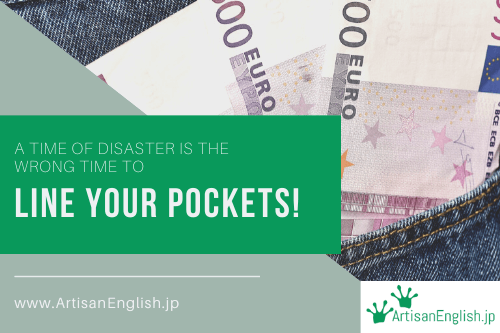
YouTube / iTunes / Spotify / Radio Public / Pocket Casts / Google Podcasts / Breaker / Overcast
Listen to ArtisanEnglish.jp posts & lesson intros here.
Idiom: Line your pockets
We can be assured no two things go hand in hand as firmly as corruption and lining your pockets.
When people line their pockets, they are dishonestly making money by doing something illegal or allowing something illegal to happen.
This may create images of brown paper bags stuffed with cash being secretly passed under restaurant tables.
Yeah, sometimes it happens like that, but not always.
There are other ways to line your pockets without actually taking cash.
At this moment, the ‘gift’ scandal involving Kepco, the Kansai electricity provider, comes to mind.
You haven’t forgotten that, have you?
Managers of Kansai Electric Power Company received gifts worth millions of yen from a former and now-deceased Fukui Prefecture town official.
This guy spent money like water on gifts, trips, restaurants and other forms of entertainment.
Those Kepco managers were lining their pockets with illegal profits.
What, however, were they giving in exchange?
Look in the papers and come to your own conclusion to answer that question.
The main problem is that companies and government officials everywhere take advantage of many situations to line their pockets.
Look what happened after the Fukushima disaster.
Many companies conspired to artificially increase the cost of road construction, lining their pockets with ill-gotten gains.
There’s also another incident from last year, perhaps, in which fuel providers got together to agree on high prices to provide fuel to the Japan Coast Guard.
Sure, it may seem like this type of price-fixing hurts nobody, but in reality, we, you and I, are the ones who pay the price.
The corrupt officials of these companies are lining their pockets with our money.
Shame on them!
Like or follow ArtisanEnglish.jp on social media.
Flesch-Kincaid Readability Test
This post is understandable by someone with at least an 8th-grade education (age 13 – 14).
On the Flesch-Kincaid reading-ease test, this post scores 63.
The higher the score on a scale of 0 – 100, the easier the passage is to read.

